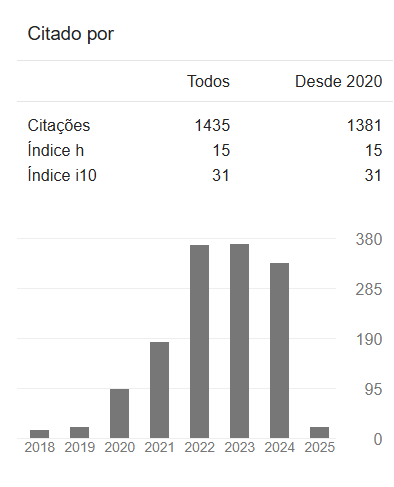Mathematics Learning in youth and Adult Education: Working Fubctions With Collaborative Problem Solving
DOI:
10.23926/RPD.2025.v10.e25009.id1135Keywords:
Teaching and learning of Mathematics, Collaborative Problem Solving, Teaching MathematicsAbstract
This article aims to reflect on the teaching of Mathematics in Youth and Adult Education. In it, we present the results of a master's research that sought to understand the contributions of the use of Collaborative Problem Solving to students in the 1st year of High School, in the EJA Modality. We sought theoretical support in Freire and Haddad; Darsie and Palma, Polya and Onuchic and Allevato. Considering the nature of our object, we used the qualitative research methodology of an interpretative nature and a pedagogical intervention character. The research instruments were: initial test to diagnose knowledge; field notebook; written records of the activities carried out by the students and questionnaires. As a result of the research, we have that from the Collaborative Problem Solving, the EJA students presented a more autonomous, meaningful and critical mathematical learning in which they developed skills to solve mathematical problems from collaboration.
Downloads
Metrics
References
Referências
ARAÚJO, José Paulo de. Proposta de atividades para a introdução do conceito de Função no ensino fundamental. Dissertação (Mestrado), Universidade Estadual do Norte Fluminense Darcy Ribeiro – UENF, Campos dos Goytacazes -RJ, 2013.
BARRETO, Marina Menna. Tendências atuais sobre o ensino de funções no Ensino Médio. Artigo adaptado da dissertação de mestrado Matemática e Educação Sexual: modelagem do fenômeno da absorção/eliminação de anticoncepcionais orais diários. Programa de Pós Graduação em Ensino de Matemática. UFRGS, 2008.
BOGDAN, Robert; BIKLEN, Sara. Knopp. Investigação Qualitativa em Educação: uma introdução à teoria e aos métodos. Porto – Portugal. Porto Editora, 1994.
BRASIL. Lei de Diretrizes e Bases da Educação Nacional, LDB. 9394/1996.
BRASIL. Parâmetros Curriculares Nacionais. Bases Legais. Brasília: MEC, 2000.
BRUNELLI, Osinéia Albina; DARSIE, Marta Maria Pontin. Concepções de EJA e de Educação Matemática de formadores de professores e suas repercussões na formação continuada. Revista de Educação Pública, v. 27, n. 64, p. 227-250, 2018.
DARSIE, Marta Maria Pontim; PALMA, Rute Cristina Domingos da. Resolução de problemas: algumas reflexões em educação matemática.124p. Cuiabá: EdUFMT, 2013.
FEITOSA, Soraya de Araújo; MAGALHÃES, Verônica de Oliveira; MENDOZA, Héctor José García. Análise da aprendizagem de estudante autista por meio da atividade de situações problema discente no ensino remoto. Revista Prática Docente, [s. l.], v. 9, p. e24016, 2024. DOI: 10.23926/RPD.2024.v9.e24016.id771. Disponível em: https://periodicos.cfs.ifmt.edu.br/periodicos/index.php/rpd/article/view/771. Acesso em: 3 mar. 2025.
FIORI, Ernani Maria. Aprender a dizer a sua palavra. In FREIRE, Paulo. Pedagogia do oprimido. 37. ed. Rio de Janeiro: Paz e Terra, 2003.
FREIRE, Paulo. Pedagogia do Oprimido. 22. ed. Rio de Janeiro: Paz e Terra, 1987.
FREIRE, Paulo. Pedagogia do Oprimido. Rio de Janeiro: Paz e Terra, 1974.
HUAMAN HUANCA, Roger Ruben; SILVA, Ananias Félix da. Aprendizagem Matemática Colaborativa através da Resolução de Problemas e Tecnologias Digitais. Revista de Educação Matemática, [s. l.], v. 19, n. 01, p. e022024, 2022.
MAGALHÃES, Benedita Neire Almeida; DARSIE, Marta Maria Pontin. Um possível caminho para a aprendizagem crítica e colaborativa com alunos do quinto ano de uma escola pública estadual. Caderno Pedagógico, v. 21, n. 6, p. e4974-e4974, 2024.
MIRANDA, Laura. Emanuele Da Cruz; ALMEIDA. Letramento Matemático e formação docente nos centros educacionais de Jovens e Adultos em Mato Grosso (2008 - 2020). 152f. Cuiabá. DISSERTAÇÃO (Mestrado em Ensino). UNIC. Cuiabá, 2023. Disponível: https://repositorio.pgsscogna.com.br/bitstream/123456789/67357/1/DISSERTACAO%20OFICIAL%20DEFESA%20DE%20MESTRADO%20-%20LAURA%20EMANUELE.pdf
PISCHETOLA, Magda; MIRANDA, Lyana Thédiga de. Metodologias ativas, uma solução simples para um problema complexo. Revista Educação e Cultura Contemporânea, [S. l.], v. 16, n. 43, p. 30–56, 2019. Disponível em: https://mestradoedoutoradoestacio.periodicoscientificos.com.br/index.php/reeduc/article/view/5822. Acesso em: 26 fev. 2025.
POLYA, George. A arte de resolver problemas: um novo aspecto do método matemático. Tradução e adaptação Heitor Lisboa de Araújo. Rio de Janeiro: Interciência, 1995.
ROMANATTO, Mauro Carlos. RESOLUÇÃO DE PROBLEMAS NAS AULAS DE MATEMÁTICA. Revista Eletrônica de Educação, [S. l.], v. 6, n. 1, p. 299–311, 2012.
SANTOS, Adriana Barbosa; RODRIGUES, Natalia Silva da.; FREI, F. Aprendizagem colaborativa na resolução de problemas lógicos: experimento com estudantes de Ensino Médio utilizando um jogo digital. Revista de Ensino de Ciências e Matemática, v. 12, n. 4, p. 1-20, 2021.
VELOSO, Zélia Vieira Cruz. Práticas Pedagógicas na Educação de Jovens e Adultos (EJA): Interfaces com as Políticas e diretrizes curriculares. 2014. 120 f. Dissertação (Mestrado em Ciências Humanas) – Pontifícia Universidade Católica de Goiás, GOIÂNIA, 2014.
VIGNOCHI, Carine; BENETTI, Carla Silva da; MACHADO, Carmén Lúcia Bezerra; MANFROI, Waldomiro Carlos. Considerações sobre aprendizagem baseada em problemas na educação em saúde. Revista HCPA. Faculdade de Medicina – Universidade Federal do Rio Grande do Sul. 2009; 29 (1): 45-50.
Downloads
Published
How to Cite
Issue
Section
License
Copyright (c) 2025 A Revista Prática Docente tem o direito de primeira publicação

This work is licensed under a Creative Commons Attribution-NonCommercial 4.0 International License.
Authors who publish in this journal agree to the following terms:
- Authors retain the copyright and grant the journal the right of first publication, with the paper simultaneously licensed under the Licença Creative Commons Attribution allows the sharing of the work with acknowledgment of authorship and initial publication in this journal.
- Authors are authorized to take additional contracts separately, for non-exclusive distribution of the version of the work published in this journal (e.g. publish in institutional repository or as a book chapter), with acknowledgment of authorship and initial publication in this journal.











